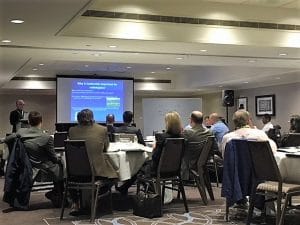By Bruce B. Forster MSc, MD, FRCPC
Professor and Head
Department of Radiology
UBC Faculty of Medicine
The above is a common response of physicians as a whole, not just radiologists, and yet negotiation is something that we all do every day, with parties ranging from members of our practice group, referring MDs, nurse/technologists/clerks, patients, administrators, government, vendors….and family members! And not uncommonly the party with whom we negotiate, at work at least, is equipped with considerable knowledge of the art and science of negotiation, putting us at a significant disadvantage.
With this in mind and based on the CAR’s members survey and evaluation summaries from the 2017 Leadership module, the CAR and the Canadian Radiological Foundation (CRF) partnered with the UBC Sauder School of Business to offer the second module of the Business/Leadership Course, on Negotiations, just before the CAR 2018 Annual Scientific M
eeting, April 25th and 26th in Montreal. The first 2017 module, on Operations, was highly evaluated by attendees, and so a similar course composition, strongly supported by interactive teaching, was utilized this year. Attendees included radiologists and residents from across Canada. Although formal evaluations are still being collated, informal response from these attendees was again strongly positive, and a number mentioned that, given activities in several provinces, the timing could not have been better.

Faculty included two business school professors, David Hannah and Rob Prowse, who teach Negotiations for the UBC Executive MBA Program, Dr. Frank Lexa, Professor of Radiology at University of Arizona and Chief Medical Officer of the Radiology Leadership Institute of the ACR, and UBC Radiologists Drs. Robyn Cairns and Bruce Forster. The program was customized to offer negotiations skills that would be impactful in addressing Canadian radiology issues, and indeed, many of the small group projects centered around the typical challenges that we all currently are facing.

There were lots of pearls to be digested, but some of the take home messages were:
- Preparation is key. Do your homework, do their homework. Don’t rush out of the CT/IR Suite and sit down with the CFO without lots of prep.
- Know your default style of negotiating, based on your personality, but know when to change that style when to your advantage.
- Distributive negotiation (e.g. buying a used car) does not account for a long-term relationship, whereas integrative negotiation does. Each has their place.
- Make sure you understand the basic structure of a negotiation—target price, resistance point, zone of potential agreement (ZOPA), and best alternative to a negotiated agreement (BATNA—your Plan B if negotiations fail).
- Spend time improving your BATNA, as this increases your power at the table.
- Establish a basis for information sharing. ‘Open the kimono’ carefully and claim your share of the combined resources.
- Multi-party, multi-interest negotiation is complicated, and it pays off to draw up a matrix and take notes.
Throughout the 1.5-day course, there was a definite buzz in the room, as radiologists from across the country dug into concepts that we had barely —if ever before— addressed. Plans for additional modules, or repeat presentation of the already-presented modules are still being discussed, and we would most value your thoughts on further educational endeavours of this sort.
Negotiations are a regular part of our day as radiologists, and we can improve patient care and the health of our specialty by mastering negotiation and leadership principles. Awareness and knowledge are key. To quote Christopher Voss, former FBI Crisis Negotiator and Professor at Georgetown School of Business:
‘The most dangerous negotiation is the one you don’t know you’re in’.
